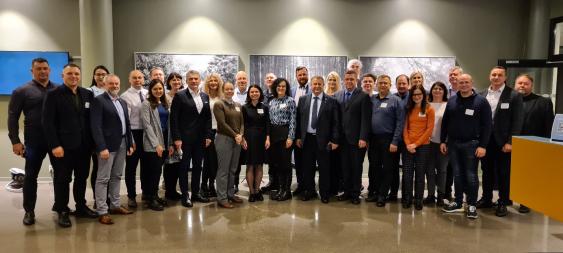The ongoing project against domestic and gender based violence in Lithuania has organized two workshops in Lithuania, and now the first one on Norwegian soil. For this workshop the group of participants was, as with previous workshops, put together with representatives from police, prosecutors, judges and NCA. The twist for this first workshop in Norway out of a total four planned, was the focus on gathering together participants from higher levels of authority.
The project aims to have a wide reach and for the ideas and concepts to reach both hands-on practitioners and their leaders alike. To succeed it is necessary to allow them all time to hear and be heard in their search for the best practices against domestic and gender based violence.
Based on this, the programme for the workshop was tailored to be both interesting and relevant according to the roles of the participants. Drawing on best practices from others on a similar level of authority was the starting point of the workshop, with opening words and presentation by the head of the section for investigations of domestic violence and sexual offences, Astri Johanne Holm. She spoke about the responsibility of the police to take action against domestic violence, and shared some keys to success from her leadership experience.
One criteria for success is good cooperation, both within the justice chain and also other experts from other fields of work. A good example is the Norwegian national mediation service, who shared their insights on solving conflict in close work with both victims and perpetrators.
Working together with other agencies can be very constructive when the cooperation works well. As illustrated by the representatives from the higher prosecution authority in Norway, giving priority to the cases makes cooperation more focused and can ease the workflow for those combatting domestic and gender based violence. If no action is taken, or not taken correctly, the cooperation can crumble and in ultimately lead to serious consequences. This was somberly illustrated by professor Ragnhild Hennum from the faculty of law at the university of Oslo in her presentation of the experiences of the intimate partner homicide committee investigation.
The workshop had a varied programme composed of presentations focused on the three main links of the justice chain, as well as a focus on keeping victims safe through leadership and active use of safeguarding tools like mobile assault alarms and reversed mobile assault alarms. Through this the project team hope the participants have left with a comprehensive base of knowledge to be used with their colleagues in Lithuania in the continued work against domestic and gender based violence in Lithuania.
You can find more pictures here.
